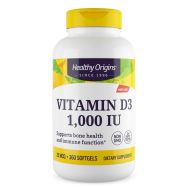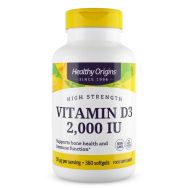What is Vitamin D3?

Vitamin D3, also known as cholecalciferol, is an essential nutrient that is crucial for maintaining strong bones, supporting the immune system, and promoting overall health and well-being. While it is possible to obtain vitamin D3 from certain foods and through exposure to sunlight, many people find it difficult to get enough of this vital nutrient through these sources alone. For this reason, vitamin D3 supplements are becoming increasingly popular, with many people turning to higher doses such as 10,000 IU (international units) of vitamin D3 per day to help meet their daily needs. In this article, we will explore the benefits and potential risks of taking vitamin D3 at this higher dosage.
Vitamin D3 is a fat-soluble vitamin that is naturally produced in the skin in response to exposure to sunlight. It can also be obtained through certain foods such as fatty fish, egg yolks, and fortified dairy products. Once in the body, vitamin D3 undergoes a series of conversions to its active form, which plays a critical role in calcium and phosphate metabolism, bone health, and immune function.
Vitamin D3 is also believed to have a number of other health benefits, including:
- Promoting cardiovascular health
- Supporting healthy cognitive function
- Boosting mood and reducing symptoms of depression
- Reducing the risk of certain types of cancer
- Supporting healthy blood sugar levels
Given these potential benefits, it is not surprising that many people are turning to vitamin D3 supplements to help meet their daily needs.
What is the Recommended Daily Intake of Vitamin D3?
The recommended daily intake of vitamin D3 varies depending on a number of factors, including age, sex, and overall health status. According to the Institute of Medicine (IOM), the recommended daily intake of vitamin D3 for most adults is 600-800 IU per day. However, some experts believe that this recommendation may be too low, particularly for individuals who are at risk of vitamin D3 deficiency.
Factors that can increase the risk of vitamin D3 deficiency include:
- Limited exposure to sunlight
- Dark skin
- Obesity
Certain medical conditions such as Crohn's disease, celiac disease, and cystic fibrosisCertain medications such as glucocorticoids and anticonvulsants
For individuals who are at risk of vitamin D3 deficiency, higher doses of vitamin D3 may be necessary to maintain optimal health. This is where supplements come in.
Why Take Vitamin D3 Supplements?
There are a number of reasons why someone might choose to take vitamin D3 supplements, including:
- Limited sun exposure: Many people spend the majority of their day indoors, making it difficult to get enough sunlight to meet their daily vitamin D3 needs.
- Dark skin: Individuals with dark skin require more sun exposure to produce the same amount of vitamin D3 as someone with lighter skin.
- Age: As we age, our bodies become less efficient at producing vitamin D3 from sunlight, making supplements a useful way to maintain optimal levels.
- Dietary restrictions: Individuals who follow a vegan or vegetarian diet may struggle to obtain adequate levels of vitamin D3 from food alone.
- Medical conditions: Certain medical conditions, such as Crohn's disease, celiac disease, and cystic fibrosis, can interfere with the absorption of vitamin D3 from food.
While it is certainly possible to obtain adequate levels of vitamin D3 through a combination of sunlight and dietary sources, supplements can be a useful tool for individuals who are struggling to meet their daily needs.








